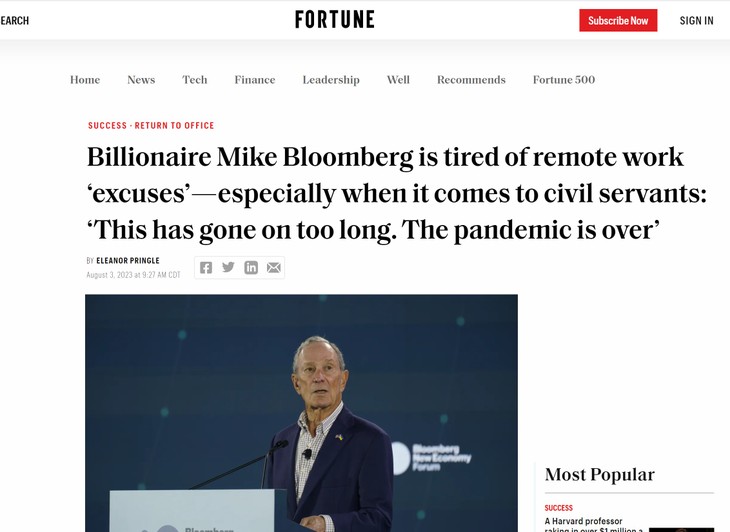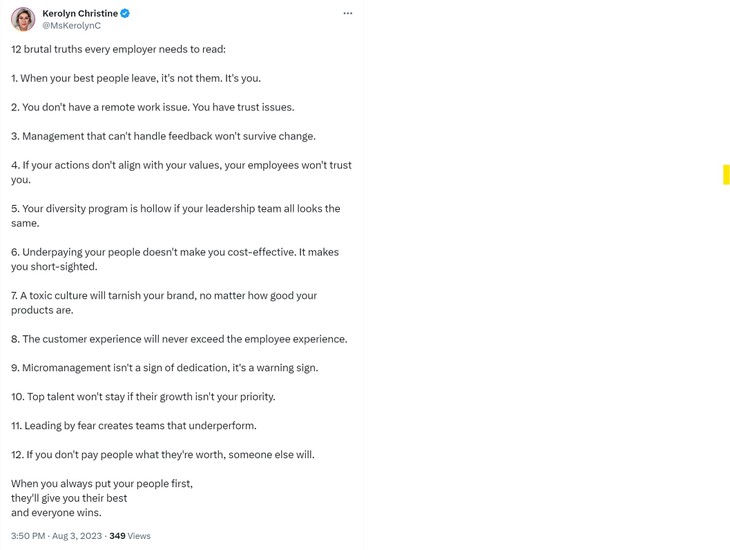There still is a battle going on out there between then remote workers of the COVID days and the companies that are trying to wheedle, nudge, and demand people return to the office.

But it’s not going as well as bosses had hoped.
I will have 4 remote jobs
I will work from an income tax free country to keep all my shekels
I will NOT go into an office
I will NOT work 9-5
I will sleep in every day
And there is absolutely NOTHING they can do about it.
COPE MORE.
— Max Wagechad: Follow to learn how to WAGEMAXX (@maxwagechad) August 1, 2023
And it sounds like the opposition fringe is dug in pretty deep.

In fact, people got so used to being home, that a fair amount of them decided they weren’t going to come back when they call went out. If what flexibility others who did returned to the office part-time have now is removed, they’re willing to walk.
…Unispace found that nearly half (42%) of companies with return-to-office mandates witnessed a higher level of employee attrition than they had anticipated. And almost a third (29%) of companies enforcing office returns are struggling with recruitment. In other words, employers knew the mandates would cause some attrition, but they weren’t ready for the serious problems that would result.
Meanwhile, a staggering 76% of employees stand ready to jump ship if their companies decide to pull the plug on flexible work schedules, according to the Greenhouse report. Moreover, employees from historically underrepresented groups are 22% more likely to consider other options if flexibility comes to an end.
In the SHED survey, the gravity of this situation becomes more evident. The survey equates the displeasure of shifting from a flexible work model to a traditional one to that of experiencing a 2-3% pay cut.
Some firms, by the nature of their business model, have had the latitude to accede to employees wishes. When back-to-the-office caused too many problems for employees, they were able to adjust the way the ran their business. Turn it into a “hybrid,” if you will, to suit their individual situation.
Coming out of the pandemic, Bart Valdez has had the mind-set of many traditional bosses. He viewed remote work as an aberration and wanted everybody back at their desks ASAP.
“I grew up in an environment where we wore a suit and tie and showed up at the office at 8 a.m. — no excuses,” said the 60-year-old chief executive officer at Ingenovis Health, a Colorado-based staffing firm with 1,600 corporate employees.
In recent months — after hearing from his employees — he’s had a change of heart.
…And so far, remote work has not hurt Ingenovis’ productivity. It’s even helped with recruiting because the company is getting more job applicants as a result of its new approach.
Today a third of Ingenovis’ employees are back in the office, one-third work entirely from home, and one-third do a hybrid mix of remote and in-person work.
Which is great for firms in their shoes. But not every firm is small enough, nimble enough, or their business the kind that benefits from people not interacting with other people. Nor is every employee capable of working from home. It’s a simple fact of life – some people need to be supervised, some people need to have others around them to function, and some people need a mix of both to be at their creative best. That’s where the rubber is meeting the road as far as a firm accommodating employee “needs” versus sustaining the business itself.
…Even as more corporations are moving to call workers back to the office, arguing it’s better for preserving company culture and decision-making, few employers have required employees to work on-site five days a week. Most are like Meta and Los Angeles-based Farmers Group, which recently announced that most employees who had been working remotely will have to come in three days a week starting in September.
Some firms have backtracked in favor of a more flexible system, or put return-to-office plans on ice, because of worker resistance and other changes wrought by the pandemic.
The economy is another factor in indulging “needs.” How far does an employer push the envelope when there is obvious friction between what management feels is best for performance and their employees’ perception of work environment. When things were humming along, and employees were hard to find, keeping them happy was paramount in many companies’ minds. They couldn’t afford to lose workers they couldn’t replace, hence the era of crazy comps for people. Those perks have pretty well slipped away, but what about the flex schedules?
Is that the last hill to die on?
…“This two to three days a week is starting to feel like a pretty decent, happy medium,” Sadow said. “Executives and employees are finding somewhat of a truce in terms of how much time is spent in the office and at home.”
How long that will last, however, is anybody’s guess.
A weakening economy and rising unemployment will give employers greater leverage to press for more days in the office. But aside from a downturn in tech, demand for white-collar workers whose jobs can be done remotely has held up well. And labor shortages may persist over the long term given the headwinds to population and workforce growth.
There’s a list in the Wall Street Journal today of things about returning to the office, like readjusting your brain and office annoyances that drive self-motivated workers insane. It’s pretty interesting.
So is the fix – go into the office more often to rewire yourself.
The Real Reason You’re Having a Hard Time Getting Things Done at the Office
Working from home altered our brains. We need more office time to fix them.If you still don’t have your office groove back, there might be a scientific explanation. Hybrid work arrangements mess with our brains.
Frustrated bosses who survey their half-empty officescapes say it makes no sense that somebody who worked full time in an office before 2020 can’t show up like they used to. But neurologists and behavioral scientists say the collective amnesia for effectively working alongside each other makes perfect sense to them.
Some workers have lost the muscle memory in their minds required to get jobs done in an open-office setting and, like flabby biceps, that muscle has to be exercised to strengthen, says S. Thomas Carmichael, professor and chair of the neurology department at UCLA’s David Geffen School of Medicine.
After years of remote work, our brains’ selective attention skills and ability to block out distractions is weakened, Carmichael says. Those who prefer to work from home might not like one of his remedies: Make yourself work from the office more often.
“The brain is really good at understanding contingencies, so if we just say ‘I’ll just get this done when I’m at home,’ we don’t learn it as well,” he says.
The Midwest is getting back to the office…the Northeast? Not so much https://t.co/JkjgaOQMUn
— Bloomberg (@business) August 3, 2023
For entrepreneurs, there are even profits to be made in the flexible schedule chaos if you get moving quick enough.
“We built WeWork Workplace as a solution for companies of all sizes, whether they have a return-to-work policy or not,” said Harish Krishna, global head of WeWork Workplace, which provides a platform for businesses to plan and manage their hybrid work. https://t.co/JyK9pd2hUd
— WeWork (@WeWork) August 1, 2023
Harness the power of possibility!
I don’t ever see the country returning to gleaming skyscrapers teeming with the working stiffs of just one company any more – or even five companies, for that matter. Commercial real estate is in such dire shape, and all those megalithic monuments to American business are empty, sub to the sub of the third twice removed sub leased just for cash-flow in the door. Or simply being auctioned off for a loss, if they can find a buyer.
Sounds like a hybrid for the win…for now.








Join the conversation as a VIP Member